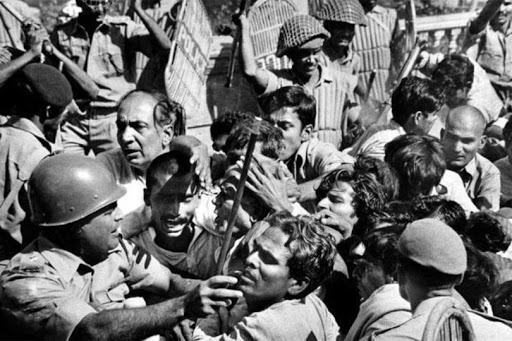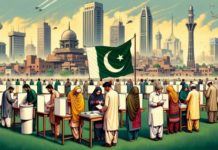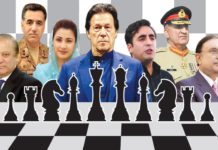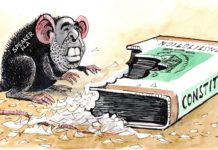May Day as the International Workers’ Day is the commemoration of the 1886 Haymarket massacre in Chicago when the police fired on workers during a strike for an eight-hour workday, killing several demonstrators. Seven anarchists were sentenced to death for instigating the Haymarket violence. On the May Day workers all over the world pay tribute to these American revolutionaries for laying their lives for the cause of the working classes. Though the working class militancy is at a low point in contemporary Pakistan yet in the past workers have fought heroic battles to win their due rights while the state has answered these struggles by re-enacting Chicago on Pakistani streets.
Chicago in Multan: On January 2, 1978 police gunned down unarmed workers at the Colony Textile Mills. The Colony Textile Mills carnage remains the most horrible event in country’s trade union history. It was Gen Zia’s puritan message to Pakistani workers who had embraced infidel socialist ideals. After military coup in July 1977, traders and industrialists were expecting a reversal of Bhutto-era nationalization. They had ardently supported the anti-Bhutto campaign. Gen Zia was equally keen to return the favour in kind by returning factories to their previous owners who immediately reduced workers’ wages and benefits or fired them outright.
The 13000 workers at Multan’s Colony Textile Mills felt threatened by the official encouragement of the bosses. Since the toppling of Bhutto government they had not received their bonus even if Mills’ production and profits were growing. Incidentally, Mughees A. Sheikh, the mill owner, had a cordial relationship with Gen Zia, a relationship cultivated when the latter was Corps Commander in Multan. It was perhaps the cordial relationship with country’s anti-worker dictator that the mill owner ignored the workers’ demands with poise.
The workers’ demands were arrogantly disregarded; they went on a strike on December 29, 1977. The management invited the union leadership for the negotiations. The People’s Labour Union having won the referendum enjoyed the CBA-status.
On January 2, 1978 talks were held between the union representatives, the Labour Department officials, martial law authorities, and the local administration. Mills’ administration and the union had almost reached an agreement on the question of bonus but the payment of wages for the strike days remained disputed. The management was adamant that the strike was illegal and workers would not be paid for the time lost in the strike.
While negotiations were still in process, agitated workers began to gather on the mill’s premises for an informational meeting in the vicinity of mill owner’s residence. The police were already present and ordered the workers to immediately disperse. Workers refused to budge. The police resorted to baton charge but the workers resisted instead of escaping the scene.
As most of the workers were residing in the workers’ colony on the premises, their families joined the police confrontation too. Then the police opened fire on the unarmed workers. According to official and newspapers reports, 14 workers were killed. The PPP-organ daily Mussawat reported 22 deaths. However, the Workers Action Committee that had emerged during this struggle estimated that 133 workers were killed and over 400 were injured.
The military authorities instituted an inquiry headed by a brigadier. A police S.H.O, Raja Khizer Hayat, and a police constable, Hakim Ali, were suspended and tried in a military court. The massacre sparked a country-wide protest as unions observed Black Day on the 9th and 10th January, 1978.
Chicago in Karachi: On Feb 10, 1972 Bhutto announced labour policy along stern warnings against gherao and jelao . ‘The strength of street will be met by the strength of state,’ he roared. However, Karachi’s industrial workers, elated indeed when Bhutto came to power, dismissed his warnings as opportunist gimmickry. Many had joined the PPP, faced jail and oppression for the democratic struggle led by Bhutto himself. Bhutto promised to reinstate the factory workers laid redundant in the past several years by the mill owners.
He had vowed to confiscate the passports of the industrialists who had deposited assets in the off-shore banks. He wanted them to bring the looted money back to the country. Even the state media when Bhutto came to power, began to sound radical. Hence, workers who had only recently humbled country’s first military dictator, were resorting to militant actions to win their due rights. From January to June 1972, industrial workers at Karachi’s industrial districts were indeed in rebellious mood.
Simultaneously, workers’ solidarity was at its best. When Zebtun Textile Mills was closed down and 2000 workers were rendered jobless, 200,000 industrial workers in Karachi went on strike across SITE on March 28, 1972. The Bhutto government began to see a ‘foreign hand’ behind working class militancy. State-controlled media also unleashed an anti-trade union propaganda. A momentum was being built for a face-off. A pretext for state brutality was provided by the bosses at the Feroz Sultan Textile Mills.
On June 7, 1972 as the workers gathered to receive their wages, they were informed that their back pay, over due for a month, would not be paid. Also, the management had refused the workers other rights. The workers went on an instantaneous gherao. They were joined by their comrades from the surrounding factories. A 5000-strong gherao was in progress when police arrived and opened fire. Three workers embraced martyrdom. Next day, as their charged funeral processions were heading for cemetery, police fired at the workers and their families yet again leaving ten dead. It was Haymarket all over again!
Chicago in Faisalabad: On June 20, 1958 police shot dead six workers in Faisalabad and shot injured another 21. The workers had occupied a factory for the release of an arrested union leader. In mid-2010, power loom workers in Faisalabad went on a series of major strikes and demonstrations. The state instead of siding with workers, arrested six union leaders. Once in detention, they were additionally charged under anti-terrorist legislation. The six have now been sentenced to a total of 490 years’ jail.








